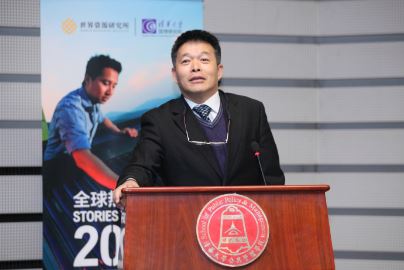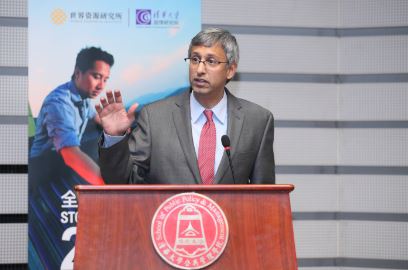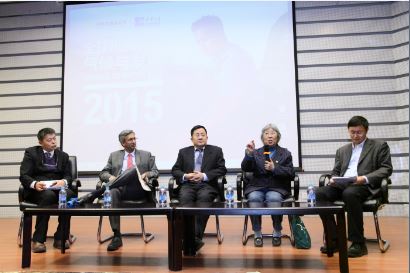On March 3, 2015, Institute for Contemporary China Studies at Tsinghua University and WRI China co-hosted Stories to Watch 2015 in Beijing, addressing global issues on climate change and sustainable development at SPPM. This is the third consecutive year for the two organizations to present this flagship event to Chinese audiences, as one stop of its worldwide tour to Washington, D.C., New York, and more.
Dr. HU Angang, Director of the Institute for Contemporary China Studies at Tsinghua University and Manish Bapna, Executive Vice President and Managing Director at the World Resources Institute (WRI), , presented their insights into the top environmental and development issues that will shape 2015 for China and the world.


“In December, the global community is expected to forge the world’s first universal climate agreement in Paris. Built on commitments from all countries,’ this dynamic climate agreement can drive national climate action, sending a predictable signal to markets and capitals that the low-carbon transition is underway,” said Bapna. “Countries are coming together to take strong action in order to drive better economic growth. Cooperation between the United States and China can help to achieve an ambitious global agreement later this year.
Pro. Hu Angang stated, “The ‘ New Normal’ of China’s economy will pay more attention to the quality of economic development, embracing a green and sustainable pathway, which provides substantial opportunities to achieving absolute GHG emissions reduction target in the nation’s further development stages. The announced emission reduction target of US and China as well as the consensus between these two countries have significant meanings to the success of Climate Summit in Paris.”
Mr. GAO Feng, Special Representative for Climate Change Negotiations of the Ministry of Foreign Affairs, Ms. QIAN Yi, Professor of the Department of Environmental Science and Engineering of Tsinghua University, and Mr. ZHUANG Guiyang, Professor of Institute for Urban & Environmental Studies (IUE), Chinese Academy of Social Sciences (CASS), all shared their insights from governmental and academic spheres.

Stories to Watch 2015
Experts at WRI have analyzed trends, observations, and data to highlight five key environmental and development Stories to Watch in 2015:
A Global Deal on Climate Change
Global temperature is reaching new heights, while energy prices are cooling down, posing barriers for energy structure transition. Leaders around the world have made significant pledges to cope with climate change, including the eye-catching climate deal struck between China and the US. Everybody is looking toward COP21 in Paris and asking what will the agreement look like? How ambitious it will be? And who will be the leaders?
Sustainable Development Goals
Significant progress has been made on the Millennium Development Goals, but we know there is still much to do to eradicate poverty and achieve sustainable, economic growth. 2015 is the year the Sustainable Development Goals will be finalized. Countries will embed sustainability throughout the goals and the will be truly universal in scope. Will the new goals help to drive national action?
Shifting to Green Investments
Building momentum for green finance was a hot topic in 2014. At the UN Climate Summit in New York, $100 billion was pledged to be decarbonized by institutional investors, and the Green Climate Fund has $10 billion pledged to date. China is taking a lead on green finance. Are developing countries playing a bigger role in climate finance? And who are the new actors in this field?
Cities in the Spotlight
At present, cities account for 80% of global GDP. However, the current development model is not sustainable. It is reported that 3.7 million people died of outdoor air pollution in 2012, and it is estimated that annual traffic fatalities will increase to 2.4 million by 2030. In spite of all the challenges, this is also a year of great global opportunities in cities. What actions will mayors and other officials take to address urban challenges in 2015?
New Coalitions for Action: Will They Deliver?
In major aspects of environmental protection and sustainable development, we see new partnerships between governments, businesses and civil society emerging. The Tropical Forest Alliance aims to eliminate tropical deforestation from commodities by 2020, in which WRI’s Global Forest Watch plays an essential role. Businesses and governments are working together to build momentum is for the restoration of degraded forests and landscapes, with 60 million hectares committed so far. An informal “carbon club” has attracted 73 governments and over 1,000 companies. Finally, the Compact of Mayors covers 228 cities worldwide with the commitment to cut 13 gigatons by 2050. Will these coalitions overcome various barriers and deliver satisfactory outcomes as they committed?
(From WRI)
